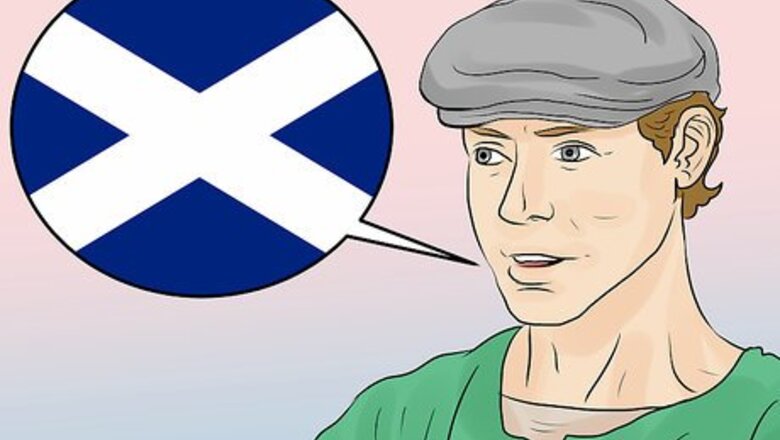
views
Understanding Pronunciation
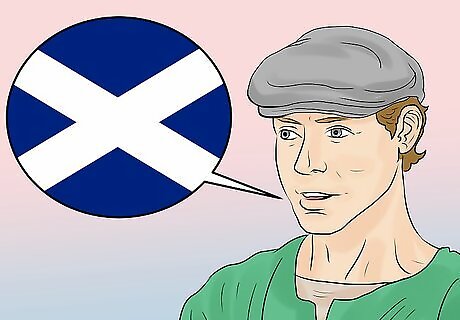
Understand the differences in Scottish dialects. Just like American, Canadian, and English accents, Scottish accents vary widely based on region. If you are wanting to speak with a Scottish accent, chances are you are thinking of the kind of Scottish accent you hear in movies and on television. These accents are typically from the Lowlands and Midlands. A "generic" Scottish accent is hard to define because there are so many types. But, you can learn to speak with a general accent that non-Scottish people would be able to identify as Scottish. Most of the Scottish accents that you may hear come from the Lowland and Midland areas. These are the regions where the more populated cities such as Edinburgh, Glasgow, and Galloway reside. However, even the accents of these more populous regions will differ. Galloway, which is south-west, sounds slightly closer to Irish as it’s close to Northern Ireland. Additionally, there is a difference in the accents from Glasgow and Edinburgh, not unlike how a New York and Boston accent differ from one another.
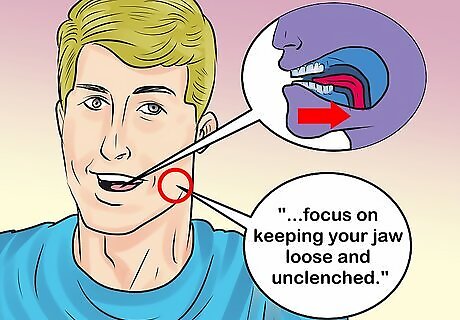
Set your oral posture. Oral posture, or vocal tract posture, is the way you position your jaw, lips, tongue, teeth, and even vocal chords to speak a certain way. There are some basic techniques you can employ with the positioning of your articulators (lips, teeth, tongue, hard and soft palate, etc.) to speak with a Scottish Accent. Set the tip of your tongue far back in your mouth. When you speak, pull your tongue back toward your throat. Doing this will help you get the harsher, guttural sounds associated with Scottish accents. When speaking, you still want to keep a lot of movement or action in your lips and jaw. Keep your lips out and open your mouth as if to get your lips around each sound and word. Because you are pulling your tongue back, you may be tempted to close or tighten your lips. To counteract this, focus on keeping your jaw loose and unclenched.
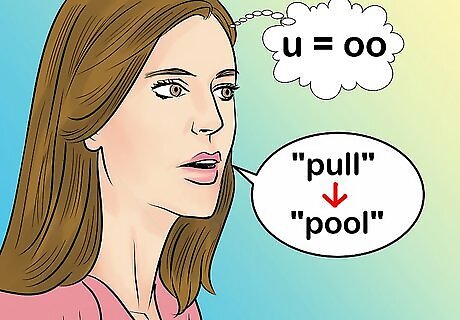
Pronounce like words the same, join syllables in words, and drop "g" endings. Unlike in American English where "pull" has a slightly different pronunciation than "pool", in a Scottish accent, both words sound like "pool". When trying a Scottish accent, think of "u" sounds as "oo" sounds. If there are two short words together, pronounce the two as one. "Did not" often becomes "didnae" or "dinnae." However, avoid speaking too fast. Drop the 'g' sound from words ending in a 'g.' For example, say "evenin’" instead of "evening." "Sewing" becomes "sewin’".
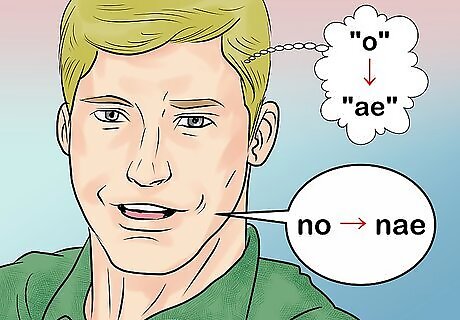
Replace "o’s" with "ae" sounds. The "ae" sound, officially known as the Near-Open Front Unrounded Vowel, is an "ah" sound with more emphasis on the "a" and less on the "h". You hear this sound when you pronounce words like "have" and "that" in American Standard English. Try making the "ah" sound in words like "Not" to become "nae." Words that end in "oo" sounds get more of the "ae" pronunciation as well. "To" is pronounced as "tae". "Do" becomes "dae". Additionally, "no" gets a bit of an "aw" sound at the end making it sound like "naw" or "nae". Another example of changing how you pronounce words is in the sentence "I am going to the shops over there." In a Scottish accent, it would be pronounced as "Am gan tae the shoaps oor air."
Playing with Vowels and Consonants
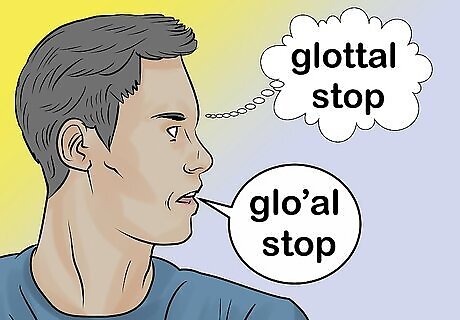
Play with the glottal stop. The glottal stop is made when you close off airflow in your throat during a word to pronounce your "t’s". Think of it like an absence of sound. For example, if you were to say "glottal stop" with a Scottish accent, you would say "glo’al stop". The glottal stop is not used for every "t" sound in a Scottish accent. If you have a "t" at the beginning of a word you would still pronounce the "t". For example, "that" would sound like "tha". And at the end of the word, you would constrict your throat to stop the airflow.
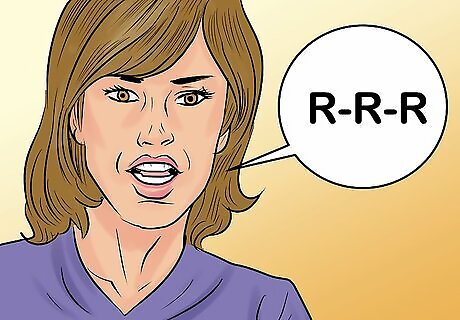
Learn to roll your "r's". Roll your "r's" only once. Do this especially after a "d", "t" or a "g". Words like "draw", "trip", and "grand" all get a rolling "r" sound. Words like "where" can get a bit of an "r" roll, but here you want to touch the tip of your tongue to the roof of your mouth after the "r" sound. This action forms a sort of "de" sound. So "where" becomes more like "wherde". This is also called tapping your "r’s".
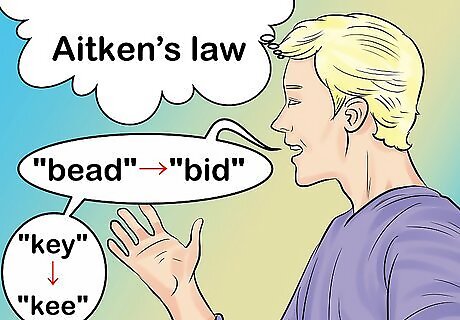
Follow Aitken’s law. Aitken’s law is the vowel length rule that characterizes how different Scottish vowels are formed. Before learning each specific vowel pronunciation, you can generalize vowel pronunciation to help you get a feel for speaking in a Scottish accent. Generally, vowels which are followed by consonants are short. Short vowels appear in words like "bead" which is pronounced "bid". In a Scottish accent, the word "mood" rhymes with "good" as you don’t elongate the "oo" in "mood". Long vowels occur when a word ends on another vowel. For example, you would pronounce a word like "key" as "kee". The same applies for a word like "done". Here it would sound more like the word "dome" but with an "n". The vowels are key in a true Scottish accent. As a general rule, vowels are less hard sounding in a Scottish accent. Vowels may be short or long, but you pronounce the vowel with more of an open mouth. Remember to keep your jaw loose and not clenched.
Using Colloquial Terms
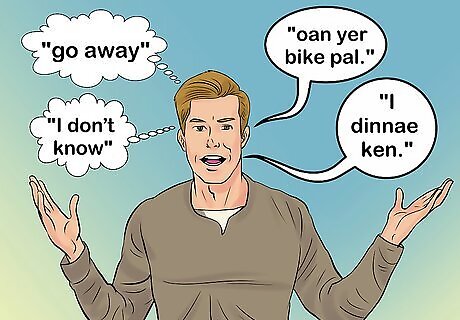
Learn slang. If you wish to pass for a Scot, you must learn to speak like one. Familiarize yourself with the slang of the Scots. Part of using slang is following the vowel and consonant rules. Certain words are also just pronounced differently. "Yes" often becomes "yae". Instead of saying "go away" you can say "oan yer bike pal." Note, a bike doesn’t have to be present. But this is a colloquial term you may hear in the Midland or Lowland areas. While you might say "I don’t know" or even "I dunno" in your normal speaking voice, it sounds quite different in a Scottish accent. To say "I don’t know" in a Scottish accent, you might say, "I dinnae ken." or simply, "I dinnae". The word "ken" is typically only spoken in Midland dialects. "Instead of "hello" you can greet someone with "awright ya?" Oftentimes, instead of saying "yes" or asking "yeah?" you would simply say "eh?"
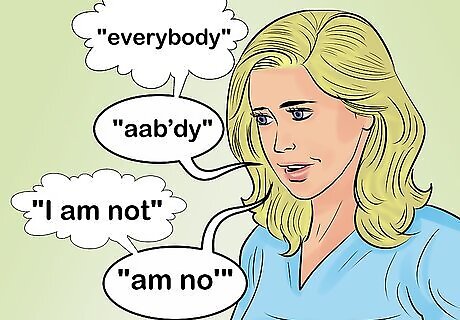
Shorten and change certain words. It’s hard to get every colloquialism down, but a lot of Scottish terms are simply changing American, Canadian, and English words by employing vowel and consonant rules. For example, instead of saying "everybody" you could say "aab’dy". Here you are condensing the word from five syllables down into roughly two. "I am not" becomes "am no'". Here, "am" serves the same purpose as "I’m".

Listen to people speaking the accent. The best way to develop a Scottish accent is by listening to it. Get to know any Scots you may know a little better, watch Scottish movies or even go to visit Scotland. Television shows like Doctor Who often have Scottish actors who speak in his or her natural accent. Karen Gillan, David Tennant, and Peter Capaldi are all Scottish. Listen to how these actors speak compared to the English actors on the show. James McAvoy and Gerard Butler are two other Scottish actors to listen to. Watching interviews of these actors is a good way to listen to the accent. Both the film and the book "Trainspotting" are also great ways to get acclimated to the Scottish accent. The book is written phonetically so when you read it aloud you are forced to speak with an accent. Both 'Dead Man's Chest' and 'At World's End' from the Pirates Of The Caribbean series feature Bill Nighy as Davy Jones, where he speaks with a heavy Scottish brogue.

















Comments
0 comment